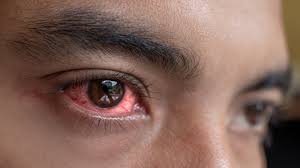As the summer sun beats down, it’s not just your skin that needs protection – your eyes require special attention too. The intense heat and UV rays can pose significant risks to your eye health, leading to various issues such as conjunctivitis, infections, redness, and even migraines. Hence, safeguarding your vision during the summer months becomes paramount.
Common eye problems in summer months
Summer is a time for outdoor fun, but it also brings its fair share of challenges, especially when it comes to our eyes. The combination of scorching heat, intense sunlight, and outdoor activities can contribute to various eye problems.
Conjunctivitis:

Conjunctivitis, commonly known as pink eye, is a prevalent eye condition during the summer months. It’s characterized by redness, itching, and discharge from the eyes. Bacterial and viral infections, as well as allergens like pollen and chlorine from swimming pools, can trigger conjunctivitis.
Dry Eyes:
Dry eyes occur when the eyes lack sufficient lubrication, leading to discomfort, itching, and a gritty sensation. In the summer, increased outdoor activities, and exposure to wind and sunlight can exacerbate dry eye symptoms.
Sunburned Eyes:
Just like our skin, our eyes can get sunburned too. Prolonged exposure to UV rays without adequate protection can cause sunburned eyes, also known as photokeratitis. Symptoms include pain, redness, blurred vision, and sensitivity to light.
Allergic Reactions:
Summer brings an abundance of pollen and other allergens, triggering allergic reactions in many individuals. Allergic conjunctivitis, characterized by red, watery eyes and itching, can make outdoor activities uncomfortable for allergy sufferers.
8 Tips: How to Keep Cool Eyes during summer
As one of the most vital organs, our eyes are susceptible to various issues exacerbated by the intense heat of summer. Conditions such as conjunctivitis, infections, redness, and migraines can significantly impact eye health during this time. Hence, it’s essential to implement proper eye care measures to mitigate these risks and ensure optimal vision and comfort throughout the summer season.
Minimize UV Exposure
Opt to stay indoors during the peak hours of sunlight, typically in the middle of the day, to reduce exposure to harmful ultraviolet radiation and its effects on your skin.
Sunglasses
It’s crucial to wear sunglasses whenever you’re outside to shield your eyes from harmful UVA and UVB rays. Doing so not only helps prevent migraines but also reduces the risk of developing serious conditions like cataracts.
Eye Hygiene
It’s essential to uphold proper hygiene practices by thoroughly washing your hands and face immediately upon arriving home. This simple routine helps prevent the entry of dust or grime into your eyes, which can otherwise lead to allergies and infections.
Adequate Sleep
It’s crucial to ensure you get 6 to 8 hours of sleep each night as it plays a vital role in rejuvenating your eyes.
Wear Protective Goggles
Before taking a dip in the pool, always remember to wear your swimming goggles. Failing to do so may increase the risk of contracting conjunctivitis.
Don’t Splash
Avoid splashing water directly into your eyes unless there are foreign particles present, such as dust. Doing so can damage the tear film, which serves as a protective layer for your eyes.
Use Cucumber Slices
Place a slice of cucumber on each eye to help relax and cool them down.
Eat More Vegetables
Including green vegetables, carrots, nuts, liver, and fruits in your meals can greatly benefit the health of your eyes.



